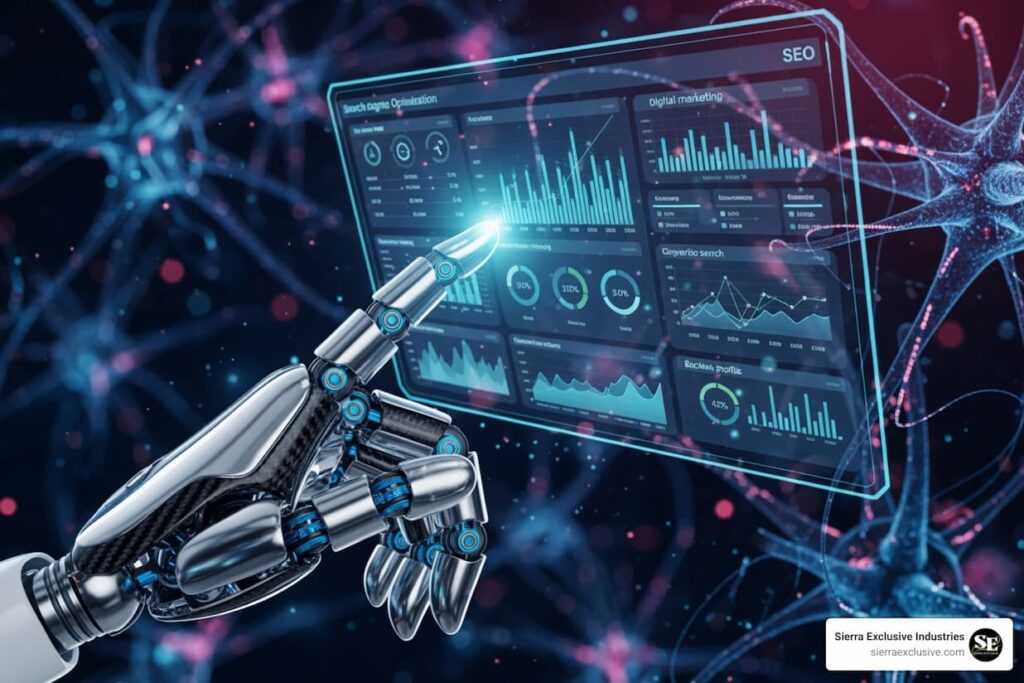Does automated AI SEO work?
Search Engine Optimization (SEO) has always been a mix of science, creativity, and persistence. But now, with the rise of generative AI and advanced automation tools, a big question is echoing across the marketing world:
So will using AI for SEO work? The short answer: yes, AI can automate large portions of SEO with incredible efficiency. But here’s the nuance: automation alone won’t win you sustainable results. Success comes when businesses combine AI’s speed and data processing power with human creativity, strategy, and oversight.
Let’s break down the myths, explore the realities, and see how to maximize AI for your SEO strategy.
Rise of Automated AI SEO
AI isn’t just a buzzword — it’s already transforming SEO workflows. From content generation to technical audits, AI tools are shaving hours off tasks that once drained teams.
According to SeoProfy, 86% of SEO professionals have already integrated AI into their processes, and 67% cite repetitive task automation as the biggest benefit.
DemandSage reports that AI-driven SEO campaigns achieved a 45% increase in organic traffic and a 38% rise in conversions for eCommerce businesses adopting the technology.
Clearly, AI is not only capable of automating SEO — it’s already doing so. But it’s important to separate fact from fiction about what that really means.
Misunderstandings About AI and SEO
Despite the excitement, misconceptions persist. Let’s debunk the biggest ones:
Myth #1: AI Can Replace SEO Experts
Yes, AI can automate keyword research, draft content, and even optimize on-page elements. But SEO is more than execution — it’s about understanding audiences, aligning with business goals, and adapting to algorithm shifts. AI accelerates the work, but humans set the direction.
Myth #2: AI-Generated Content Always Ranks
AI can produce polished articles fast, but ranking depends on depth, originality, and user value. Thin, generic content may get indexed but rarely performs well. The best-ranking content blends AI efficiency with human originality.
Myth #3: AI Perfectly Understands Search Intent
AI analyzes queries at scale, but intent is nuanced. Cultural context, emotional tone, and buyer psychology still need human interpretation.
Myth #4: AI Guarantees Instant Rankings
SEO is a long game. While AI speeds up execution, results still depend on factors like backlinks, domain authority, and content trustworthiness.
Myth #5: AI Eliminates the Need for Originality
Far from it. Google’s Helpful Content guidelines reward experience, expertise, authoritativeness, and trust (E-E-A-T). That means original thought leadership, data-backed insights, and authentic brand voice remain critical.
What AI Can Actually Automate in SEO
When used strategically, AI is a powerhouse. Here’s what it excels at:
Keyword Research & Clustering: Instantly grouping related terms and surfacing hidden opportunities.
Content Outlining & Drafting: Generating first drafts and structures at scale.
On-Page Optimization: Suggesting meta tags, headings, and internal linking strategies.
Technical SEO Audits: Spotting broken links, slow pages, and crawl issues faster than manual checks.
SERP & Competitor Analysis: Identifying ranking patterns and content gaps.
Personalization & Localization: Tailoring content variations for different audiences or regions.
Data supports these efficiencies: an Influencer Marketing Hub report found that 44.1% of SEO tasks are now automated by AI within businesses that use it.
Where Human Strategy Is Still Essential
Automation is powerful — but humans amplify it. Here’s where strategy still requires a human touch:
Defining Brand Voice and Storytelling: AI drafts, but people ensure alignment with brand identity.
Audience Psychology & Context: Humans capture nuance and cultural relevance AI might miss.
Original Insights & Authority Building: Case studies, expert opinions, and PR outreach build trust no machine can replicate.
Adapting to Algorithm Changes: Humans interpret shifts and adjust strategy faster than tools.
Ethics & Quality Control: Fact-checking, avoiding bias, and ensuring authenticity.
In other words: AI can scale execution, but humans ensure resonance and credibility.
How to Maximize AI in Your SEO Strategy
To truly benefit, businesses should take a hybrid approach:
Automate Repetitive Tasks: Let AI handle keyword clustering, drafts, and audits.
Layer Human Insight: Add unique examples, insights, and voice to AI outputs.
Double Down on E-E-A-T: Attribute content to real experts, add case studies, and cite sources.
Use AI for Analytics: Predictive modeling and SERP analysis help anticipate trends.
Quality Over Quantity: Avoid flooding your site with AI content — focus on depth, not volume.
This balance delivers both scale and authority.
Future of Automated AI SEO
The role of AI in search is only growing:
With Google’s AI Overviews and conversational search tools, how users engage with results is shifting.
Semrush projects that by 2028, AI-driven search may rival traditional traffic sources in certain industries.
And according to Influencer Marketing Hub’s benchmark report, 17% of marketers say they’re already saving more than 10 hours a week thanks to AI automation.
But through all these shifts, one truth remains: human creativity and strategy will always be the competitive differentiator.
Conclusion
So, can AI really automate SEO?
Yes — AI can automate much of the SEO process, from research to optimization to technical checks.
But automation alone won’t deliver lasting growth. The real magic happens when businesses pair AI’s efficiency with human strategy, creativity, and authenticity.
At Sierra Exclusive, we see AI not as a replacement for marketers, but as a force multiplier. Used wisely, it frees teams to focus on strategy, storytelling, and innovation — the elements that truly set brands apart.
Contact us today to schedule a free strategy consultation with our team and to kickstart your growth online.

